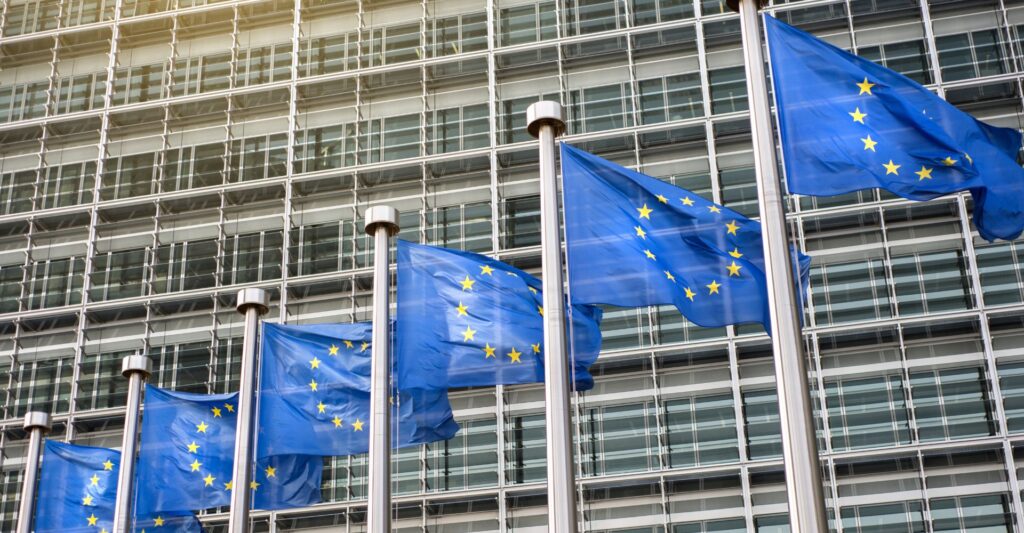EU Sets Ambitious 2040 Climate Target: A Path to Neutrality

The Commission has published a detailed impact assessment on possible pathways to reach the agreed goal of making the European Union climate neutral by 2050. Based on this impact assessment, the Commission recommends a 90% net greenhouse gas emissions reduction by 2040 compared to 1990 levels, launching a discussion with all stakeholders; a legislative proposal will be made by the next Commission, after the European elections, and agreed with the European Parliament and Member States as required under the EU Climate Law. This recommendation is in line with the advice of the European Scientific Advisory Board on Climate Change (ESABCC) and the EU’s commitments under the Paris Agreement.
This communication also sets out a number of enabling policy conditions which are necessary to achieve the 90% target. They include the full implementation of the agreed 2030 framework, ensuring the competitiveness of the European industry, a greater focus on a just transition that leaves no one behind, a level playing field with international partners, and a strategic dialogue on the post-2030 framework, including with industry and the agricultural sector. The outcome of COP28 in Dubai shows that the rest of the world is moving in the same direction. The EU has been leading the way on international climate action, and should stay the course, creating opportunities for European industry to thrive in new global markets for clean technology.
Predictability and sustainability for our economy and society
Setting a 2040 climate target will help European industry, investors, citizens and governments to make decisions in this decade that will keep the EU on track to meet its climate neutrality objective in 2050. It will send important signals on how to invest and plan effectively for the longer term, minimising the risks of stranded assets. With this forward-planning, it is possible to shape a prosperous, competitive and fair society, to decarbonise EU industry and energy systems, and to ensure that Europe is a prime destination for investment, with stable future-proof jobs.
It will also boost Europe’s resilience against future crises, and notably strengthen the EU’s energy independence from fossil fuel imports, which accounted for over 4% of GDP in 2022 as we faced the consequences of Russia’s war of aggression against Ukraine. The costs and human impacts of climate change are increasingly large, and visible. In the last five years alone, climate-related economic damage in Europe is estimated at €170 billion euros. The Commission’s impact assessment finds that, even by conservative estimates, higher global warming as a result of inaction could lower the EU’s GDP by about 7% by the end of the century.
Establishing the conditions for achieving the recommended target
Achieving a 90% emissions reduction by 2040 will require a number of enabling conditions to be met. The starting point is the full implementation of the existing legislation to reduce emissions by at least 55% by 2030. The ongoing update of the draft National Energy and Climate Plans (NECPs) is a key element in monitoring progress and the Commission is engaging with Member States, industry and social partners to facilitate the necessary action.
The Green Deal now needs to become an industrial decarbonisation deal that builds on existing industrial strengths, like wind power, hydropower, and electrolysers, and continues to increase domestic manufacturing capacity in growth sectors like batteries, electric vehicles, heat pumps, solar PV, CCU/CCS, biogas and biomethane, and the circular economy. Carbon pricing and access to finance are also critical for the delivery of emission reduction targets by European industry. The Commission will set up a dedicated taskforce to develop a global approach to carbon pricing and carbon markets. Europe will also need to mobilise the right mix of private and public sector investment to make our economy both sustainable and competitive. A European approach on finance will be needed in the coming years, in close cooperation with Member States.
Fairness, solidarity and social policies need to remain at the core of the transition. Climate action has to bring benefits to everybody in our societies, and climate policies need to take into account those who are most vulnerable, or face the greatest challenges to adapt. The Social Climate Fund and Just Transition Fund are examples of such policies which will already help citizens, regions, businesses and workers in this decade.
Finally, open dialogue with all stakeholders is a crucial precondition to delivering the clean transition. The Commission has already established formal dialogues with industry and agricultural stakeholders, and the coming months of political debate in Europe are an important opportunity to secure public engagement on the next steps and policy choices. Structured dialogue with social partners should be strengthened to ensure their contribution, focusing on employment, mobility, job quality, investments in reskilling and upskilling. This ongoing outreach will help the next Commission to table legislative proposals for the post-2030 policy framework which will deliver the 2040 target in a fair and cost-efficient manner. The pace of decarbonisation will depend on the availability of technologies that deliver carbon-free solutions, and also on an efficient use of resources in a circular economy.
The energy sector is projected to achieve full decarbonisation shortly after 2040, based on all zero and low carbon energy solutions, including renewables, nuclear, energy efficiency, storage, CCS, CCU, carbon removals, geothermal and hydro. The Industrial Alliance on Small Modular Reactors, launched today, is the latest initiative to enhance industrial competitiveness and ensure a strong EU supply chain and a skilled workforce. An important benefit of these efforts is a lower dependence on fossil fuels thanks to an 80% fall in their consumption for energy from 2021 to 2040. The post-2030 policy framework will be an opportunity to develop these policies further and complement them with social and industrial policies to ensure a smooth transition away from fossil fuels.
The transport sector is expected to decarbonise through a combination of technological solutions and carbon pricing. With the right policies and support, the agriculture sector can also play a role in the transition, while ensuring sufficient food production in Europe, securing fair incomes and providing other vital services such as enhancing the capacity of soils and forests to store more carbon. A holistic dialogue with the broader food industry, also beyond the farm gate, is crucial to success in this area and to the development of sustainable practices and business models.
Related Article: Governments’ Fossil Fuel Production Plans Contradict Climate Targets, UN Warns
The EU will continue to develop the right framework conditions to attract investment and production. A successful climate transition should go hand-in-hand with strengthened industrial competitiveness, especially in clean tech sectors. A future enabling framework for industry decarbonisation should build on the existing European Green Deal Industrial Plan. Public investment should be well targeted with the right mix of grants, loans, equity, guarantees, advisory services and other public support. Carbon pricing should continue to play an important role in incentivising investments in clean technologies and generating revenues to spend on climate action and social support for the transition.
Achieving the 90% recommended target will require both emissions reductions and carbon removals. It will require deployment of carbon capture and storage technologies, as well as the use of captured carbon in industry. The EU’s Industrial Carbon Management strategy will support the development of CO2 supply chains and the required CO2 transport infrastructure. Carbon capture should be targeted to hard-to-abate sectors where alternatives are less economically viable. Carbon removals will also be needed to generate negative emissions after 2050.












